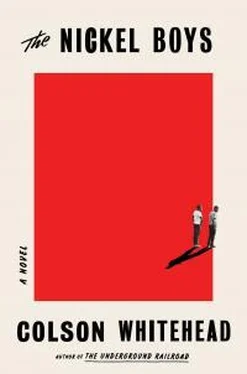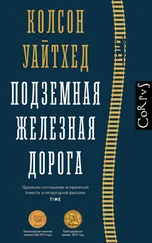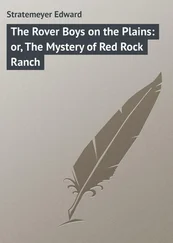Колсон Уайтхед - The Nickel Boys
Здесь есть возможность читать онлайн «Колсон Уайтхед - The Nickel Boys» весь текст электронной книги совершенно бесплатно (целиком полную версию без сокращений). В некоторых случаях можно слушать аудио, скачать через торрент в формате fb2 и присутствует краткое содержание. Год выпуска: 2019, Издательство: Penguin Random House LLC, Жанр: roman, на английском языке. Описание произведения, (предисловие) а так же отзывы посетителей доступны на портале библиотеки ЛибКат.
- Название:The Nickel Boys
- Автор:
- Издательство:Penguin Random House LLC
- Жанр:
- Год:2019
- ISBN:нет данных
- Рейтинг книги:4 / 5. Голосов: 1
-
Избранное:Добавить в избранное
- Отзывы:
-
Ваша оценка:
- 80
- 1
- 2
- 3
- 4
- 5
The Nickel Boys: краткое содержание, описание и аннотация
Предлагаем к чтению аннотацию, описание, краткое содержание или предисловие (зависит от того, что написал сам автор книги «The Nickel Boys»). Если вы не нашли необходимую информацию о книге — напишите в комментариях, мы постараемся отыскать её.
), that the world began to care.
The Nickel Boys — читать онлайн бесплатно полную книгу (весь текст) целиком
Ниже представлен текст книги, разбитый по страницам. Система сохранения места последней прочитанной страницы, позволяет с удобством читать онлайн бесплатно книгу «The Nickel Boys», без необходимости каждый раз заново искать на чём Вы остановились. Поставьте закладку, и сможете в любой момент перейти на страницу, на которой закончили чтение.
Интервал:
Закладка:
Blakeley’s room was to the right at the top of the stairs. Behind the other door lay the small hallway and the three rooms. The rooms had been repainted for the inspection and piles of bedding and surplus mattresses moved inside. The paint hid the initials of the cells’ previous inhabitants, the scratches in the darkness over the years. Initials, names, and also a range of cuss words and entreaties. When the doors opened and the scratches were revealed to the boys who had written them, the hieroglyphics did not resemble what they remembered putting into the walls. It was all demonology.
Spencer and Hennepin hauled the sheets and mattresses to the rooms on either side. The room was empty when they shoved Elwood in. The next afternoon a houseman on the day shift gave the boy a bucket for a toilet, but no more. Light strained through the mesh opening at the top of the door, a gray light his eyes eventually became accustomed to. They gave him food when the other boys left for breakfast, one meal a day.
The last three inhabitants of that particular room had come to bad ends. The place was worse luck on top of bad luck, cursed. Rich Baxter was sentenced to the dark cell for fighting back—a white supervisor boxed his ears, and Rich knocked out three of his teeth. He had a solid right hand. Rich spent a month in the room, thinking of the glorious violence he would deliver to the white world when he got out. Mayhem and murder and assault. Wiping his bloody knuckles on his dungarees. Instead he enlisted in the army and died—it was a closed casket—two days before the end of the Korean War. Five years later, Claude Sheppard got sent upstairs for stealing peaches. He was never the same after those weeks in the dark—a boy went in and a man hobbled out. He renounced misbehavior and sought out cures for his pervasive worthlessness, a kind of sad-sack seeker. Claude overdosed on smack in a Chicago flophouse three years later; potter’s field keeps him now.
Jack Coker, Elwood Curtis’s immediate predecessor, was discovered engaged in homosexual activity with another student, Terry Bonnie. Jack spent his dark time in Cleveland, Terry on the third floor of Roosevelt. Binary stars in cold space. The first thing Jack did when he got out was to smack Terry in the face with a chair. Well, not the first thing. He had to wait until dinnertime. The other boy was a mirror that granted a ruinous glimpse of himself. Jack died on the floor of a juke-joint floor one month before Elwood arrived at Nickel. He misheard a stranger’s remark and lashed out. The stranger had a knife.
After a week and a half, Spencer got tired of being afraid—in truth he was afraid much of the time but was unaccustomed to one of his black boys instigating that fear—and paid Elwood a visit. Things were quieting down at the statehouse, Hardee was less distressed. The worst was over. The government had too much power to interfere, was the problem in general. Way he saw it. It got worse every year. Spencer’s daddy had been a supervisor on the south campus and got demoted after one of his charges ended up choked to death. Some roughhousing that got out of hand and he was the scapegoat. Money was tight before; it got tighter. Spencer remembered those days still, the pot of canned corn beef and broth stinking up that little kitchen and him and his brothers and sisters lined up with their chipped bowls. His grandfather had worked for the T. M. Madison Coal Company in Spadra, Arkansas, minding nigger convicts. No one from the county, no one from the main office, dared to interfere with the execution of his office—his grandfather was a craftsman and enjoyed the respect of his achievements. It was demeaning, one of Spencer’s boys writing a letter on him.
Spencer took Hennepin with him to the third floor. The rest of the dormitory was at breakfast. “You’re probably wondering how long we’re going to keep you in here,” he said. They kicked Elwood a while and Spencer felt better, like a bubble of worry in his chest up and popped.
The worst thing that ever happened to Elwood happened every day: He woke in that room. He would never tell anyone about those days of darkness. Who would come for him? He had never considered himself an orphan. He had to stay behind so that his mother and father could find what they needed in California. No point having sad feelings about it—one thing had to happen for the other thing to happen. He had an idea that one day he’d tell his father about his letter, how it was just like the letter his father gave to his commanding officer about the treatment of colored troops, the one that got him a commendation in the war. But he was as much an orphan as many of the boys in Nickel. No one was coming.
He thought long on Dr. Martin Luther King Jr.’s letter from the Birmingham jail, and the powerful appeal the man composed from inside. One thing gave birth to the other—without the cell, no magnificent call to action. Elwood had no paper, no pen, just walls, and he was all out of fine thoughts, let alone the wisdom and the way with words. The world had whispered its rules to him for his whole life and he refused to listen, hearing instead a higher order. The world continued to instruct: Do not love for they will disappear, do not trust for you will be betrayed, do not stand up for you will be swatted down. Still he heard those higher imperatives: Love and that love will be returned, trust in the righteous path and it will lead you to deliverance, fight and things will change. He never listened, never saw what was plainly in front of him, and now he had been plucked from the world altogether. The only voices were those of the boys below, the shouts and laughter and fearful cries, as if he floated in a bitter heaven.
A jail within a jail. In those long hours, he struggled over Reverend King’s equation. Throw us in jail and we will still love you…But be assured that we will wear you down by our capacity to suffer, and one day we will win our freedom. We will not only win freedom for ourselves, we will so appeal to your heart and your conscience that we will win you in the process and our victory will be a double victory. No, he could not make that leap to love. He understood neither the impulse of the proposition nor the will to execute it.
When he was little, he kept lookout on the dining room of the Richmond Hotel. It had been closed to his race and one day it would open. He waited and waited. In the dark cell, he reconsidered his vigil. The recognition he sought went beyond brown skin—he was looking for someone who looked like him, for someone to claim as kin. For others to claim him as kin, those who saw the same future approaching, slow as it may be and overfond of back roads and secret hardscrabble paths, attuned to the deeper music in the speeches and hand-painted signs of protest. Those ready to commit their weight to the great lever and move the world. They never appeared. In the dining room or anywhere else.
The door to the stairwell opened, scraping against the floor. Footsteps outside the dark cell. Elwood braced himself for another beating. After three weeks they had finally decided what to do with him. He was sure that was the only reason he hadn’t been taken out back to the iron rings and then disappeared—uncertainty. Now that things had quieted down, Nickel returned to proper discipline and the customs that had been handed down from generation to generation.
The bolt slid. There was one slim silhouette in the doorway. Turner shushed him and helped Elwood to his feet.
“They’re going to take you out back tomorrow,” Turner whispered.
“Yeah,” Elwood said. Like Turner was talking about someone else. He was dizzy.
“We got to get, man.”
Elwood puzzled over the we. “Blakeley.”
“That nigger’s passed out, man. Shhh!” He handed Elwood his glasses and clothes and shoes. They came from Elwood’s locker, the ones he wore on his first day of school. Turner was also dressed in regular clothes, black trousers and a dark blue work shirt. We.
Читать дальшеИнтервал:
Закладка:
Похожие книги на «The Nickel Boys»
Представляем Вашему вниманию похожие книги на «The Nickel Boys» списком для выбора. Мы отобрали схожую по названию и смыслу литературу в надежде предоставить читателям больше вариантов отыскать новые, интересные, ещё непрочитанные произведения.
Обсуждение, отзывы о книге «The Nickel Boys» и просто собственные мнения читателей. Оставьте ваши комментарии, напишите, что Вы думаете о произведении, его смысле или главных героях. Укажите что конкретно понравилось, а что нет, и почему Вы так считаете.

![Колсон Уайтхед - Подземная железная дорога [litres]](/books/411182/kolson-uajthed-podzemnaya-zheleznaya-doroga-litres-thumb.webp)










